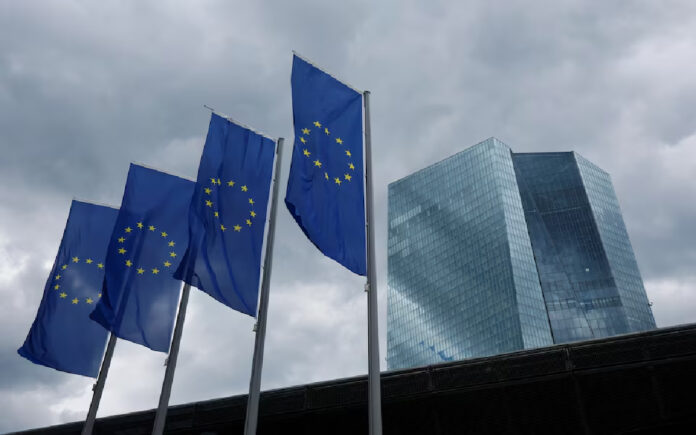Frankfurt: The European Central Bank (ECB) could still cut interest rates further as inflation moderates, according to ECB board member Piero Cipollone. He warned that the ongoing U.S.-China trade war could have significant negative repercussions for the euro zone, which consists of 20 member countries.
The ECB has already lowered borrowing costs five times since June, as concerns over economic growth have started to outweigh inflation worries. Analysts predict at least three more rate cuts this year in an effort to rejuvenate an economy that has struggled with stagnation over the past two years.
“We all agree there is still room for adjusting rates downwards,” Cipollone told Reuters in an interview. “We are almost on target…(and) we are still in restrictive territory.” However, he added that rising energy prices and escalating global trade tensions are creating uncertainty, meaning the ECB is hesitant to commit to any specific actions at this point, including the expected rate cut in March.
Despite these challenges, Cipollone emphasized that the euro zone’s economic outlook remains largely unchanged since December. At that time, the ECB projected that four rate cuts would take place in 2025, a forecast that remains intact, including the recent unanimous decision to reduce rates last month.
“The overall understanding of where we are going is there, the fundamentals haven’t changed, so I do not expect a big change in direction,” Cipollone said. “This convergence with the inflation target is coherent with a declining interest rate path.” Inflation slightly increased to 2.5% last month, but the ECB anticipates it will return to the 2% target by summer, after surpassing this level for four consecutive years.
The Impact of U.S.-China Trade Tensions
One of the biggest uncertainties, according to Cipollone, is U.S. trade policy, which could have significant repercussions for Europe, even before any direct tariffs are imposed. Cipollone expressed concern about the possibility of a full-scale trade war between the U.S. and China, calling it a more serious threat to the global economy, as China controls 35% of the world’s manufacturing capacity.
“What concerns me more is if President Trump engages in a full trade war with China,” Cipollone said. “This is a more serious threat because China has 35% of the world’s manufacturing capacity.”
Following the U.S. government’s imposition of a 10% tariff on all Chinese imports this week, Beijing responded with retaliatory measures. If China loses access to the U.S. market, it may seek alternative markets, potentially flooding Europe with discounted products, which could dampen growth and pricing power in the region, Cipollone warned.
Also Read | ECB Optimistic About Digital Euro Progress Following Trump’s Crypto Proposal
Research by the Peterson Institute for International Economics, a Washington-based think tank, suggests that while tariffs could slow U.S. growth, the country would fare better than its targets. However, Cipollone downplayed the potential impact of tariffs aimed at Europe, stating that European firms might absorb some of the increased costs by sacrificing profit margins. The weakening of the euro against the U.S. dollar would also act as a buffer for the euro zone.
While trade tensions could slow economic growth, Cipollone does not expect them to trigger a recession. Other parts of the economy, he noted, are demonstrating resilience. The labor market remains robust, consumer spending is expected to recover, construction is strong, and even the industrial sector, which has been in a recession for the past two years, is showing signs of stabilizing.
Also Read | China’s Tariffs on U.S. Oil Could Lead to Decline in Exports in 2025
“We might not be booming but I am not expecting a recession at all,” Cipollone said.
Despite the potential risks from trade tensions, Cipollone believes that inflationary pressures from energy costs and other factors will counterbalance any downward effects on inflation, keeping risks to the economic outlook well-balanced.



